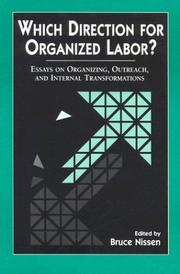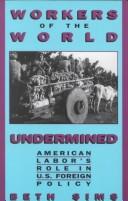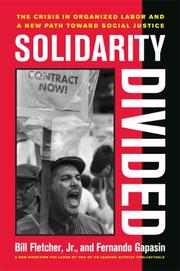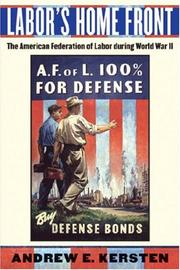| Listing 1 - 8 of 8 |
Sort by
|

ISBN: 0814327796 Year: 1999 Publisher: Detroit Wayne State University Press
Abstract | Keywords | Export | Availability | Bookmark
 Loading...
Loading...Choose an application
- Reference Manager
- EndNote
- RefWorks (Direct export to RefWorks)
#SBIB:316.334.2A418 --- #SBIB:003.IO --- Arbeidssociologie: de vakbeweging in niet-Europese landen --- Labor movement --- Labor policy --- Labor unions --- Labor and laboring classes --- Social movements --- Forecasting --- Organizing --- AFL-CIO. --- AFT-KPP --- American Federation of Labor and Congress of Industrial Organizations. --- Amerikanskai︠a︡ federat︠s︡ii︠a︡ truda-Kongress proizvodstvennykh profsoi︠u︡zov --- American Federation of Labor --- Congress of Industrial Organizations (U.S.) --- United States --- Organization --- AFT-KPP (Amerikanskai︠a︡ federat︠s︡ii︠a︡ truda-Kongress proizvodstvennykh profsoi︠u︡zov) --- American Federation of Labor and Congress of Industrial Organizations

ISBN: 0896084299 0896084302 Year: 1992 Publisher: Boston, MA South End Press
Abstract | Keywords | Export | Availability | Bookmark
 Loading...
Loading...Choose an application
- Reference Manager
- EndNote
- RefWorks (Direct export to RefWorks)
#SBIB:327H15 --- #SBIB:316.334.2A419 --- Buitenlandse politiek: Noord-Amerika --- Arbeidssociologie: Europees en wereldsyndicalisme --- Labor unions and international relations --- International relations and labor unions --- Trade-unions and foreign policy --- International relations --- AFL-CIO. --- AFT-KPP --- American Federation of Labor and Congress of Industrial Organizations. --- Amerikanskai︠a︡ federat︠s︡ii︠a︡ truda-Kongress proizvodstvennykh profsoi︠u︡zov --- American Federation of Labor --- Congress of Industrial Organizations (U.S.) --- Labor unions and foreign policy --- United States --- AFT-KPP (Amerikanskai︠a︡ federat︠s︡ii︠a︡ truda-Kongress proizvodstvennykh profsoi︠u︡zov) --- American Federation of Labor and Congress of Industrial Organizations
Book
ISBN: 9781137360212 Year: 2013 Publisher: New York Palgrave Macmillan
Abstract | Keywords | Export | Availability | Bookmark
 Loading...
Loading...Choose an application
- Reference Manager
- EndNote
- RefWorks (Direct export to RefWorks)
internationale organisaties --- Koude Oorlog --- internationale vakbondsfederaties --- C5 --- Wereldverbond van de Arbeid / Confédération Mondiale du Travail / World Confederation of Labour / Weltverband der Arbeit/ Confederación Mundial del Trabajo / (1920-2006) --- geschiedenis --- Maatschappelijke organisaties en maatschappelijk leven --- Cold War --- International labor activities --- World politics --- Coexistence (World politics) --- Peaceful coexistence --- Labor activities, International --- Labor unions --- History --- International cooperation --- AFL-CIO --- AFT-KPP --- American Federation of Labor and Congress of Industrial Organizations. --- Amerikanskai︠a︡ federat︠s︡ii︠a︡ truda-Kongress proizvodstvennykh profsoi︠u︡zov --- American Federation of Labor --- Congress of Industrial Organizations (U.S.) --- AFT-KPP (Amerikanskai︠a︡ federat︠s︡ii︠a︡ truda-Kongress proizvodstvennykh profsoi︠u︡zov) --- American Federation of Labor and Congress of Industrial Organizations
Book
ISBN: 0585067880 9780585067889 1438416113 9781438416113 Year: 1989 Publisher: Albany, NY State University of New York Press
Abstract | Keywords | Export | Availability | Bookmark
 Loading...
Loading...Choose an application
- Reference Manager
- EndNote
- RefWorks (Direct export to RefWorks)
Labor unions --- Officials and employees --- Green, William, --- AFL-CIO --- American Federation of Labor --- Federation of Organized Trades and Labor Unions of the United States and Canada --- AFL --- AFT --- AF of L --- A.F.L. --- A.F. of L. --- Amerikanskai︠a︡ federat︠s︡ii︠a︡ truda --- Federação Americana de Trabalho --- Congress of Industrial Organizations (U.S.) --- AFT-KPP --- American Federation of Labor and Congress of Industrial Organizations. --- Amerikanskai︠a︡ federat︠s︡ii︠a︡ truda-Kongress proizvodstvennykh profsoi︠u︡zov --- Labor leaders --- E-books --- AFT-KPP (Amerikanskai︠a︡ federat︠s︡ii︠a︡ truda-Kongress proizvodstvennykh profsoi︠u︡zov) --- American Federation of Labor and Congress of Industrial Organizations
Book
ISBN: 9781469633008 1469633000 9781469632995 1469632993 9781469632988 1469632985 1469661543 9798890853967 9798890853950 Year: 2017 Publisher: Chapel Hill
Abstract | Keywords | Export | Availability | Bookmark
 Loading...
Loading...Choose an application
- Reference Manager
- EndNote
- RefWorks (Direct export to RefWorks)
From the Reagan years to the present, the labour movement has faced a profoundly hostile climate. As America's largest labour federation, the AFL-CIO was forced to reckon with severe political and economic headwinds. Yet the AFL-CIO survived, consistently fighting for programs that benefited millions of Americans, including social security, unemployment insurance, the minimum wage, and universal health care. With a membership of more than 13 million, it was also able to launch the largest labour march in American history, 1981's Solidarity Day, and to play an important role in politics. In a history that spans from 1979 to the present, Timothy J. Minchin tells a sweeping, national story of how the AFL-CIO sustained itself and remained a significant voice in spite of its powerful enemies and internal constraints.
Labor unions --- Industrial unions --- Labor, Organized --- Labor organizations --- Organized labor --- Trade-unions --- Unions, Labor --- Unions, Trade --- Working-men's associations --- Labor movement --- Societies --- Central labor councils --- Guilds --- Syndicalism --- History --- AFL-CIO --- AFT-KPP --- American Federation of Labor and Congress of Industrial Organizations. --- Amerikanskai︠a︡ federat︠s︡ii︠a︡ truda-Kongress proizvodstvennykh profsoi︠u︡zov --- American Federation of Labor --- Congress of Industrial Organizations (U.S.) --- E-books --- AFT-KPP (Amerikanskai︠a︡ federat︠s︡ii︠a︡ truda-Kongress proizvodstvennykh profsoi︠u︡zov) --- American Federation of Labor and Congress of Industrial Organizations

ISBN: 0520261569 0520255259 9786612359422 1282359428 0520934741 9780520934740 9780520255258 9781282359420 Year: 2008 Publisher: Berkeley
Abstract | Keywords | Export | Availability | Bookmark
 Loading...
Loading...Choose an application
- Reference Manager
- EndNote
- RefWorks (Direct export to RefWorks)
The U.S. trade union movement finds itself today on a global battlefield filled with landmines and littered with the bodies of various social movements and struggles. Candid, incisive, and accessible, Solidarity Divided is a critical examination of labor's current crisis and a plan for a bold new way forward into the twenty-first century. Bill Fletcher and Fernando Gapasin, two longtime union insiders whose experiences as activists of color grant them a unique vantage on the problems now facing U.S. labor, offer a remarkable mix of vivid history and probing analysis. They chart changes in U.S. manufacturing, examine the onslaught of globalization, consider the influence of the environment on labor, and provide the first broad analysis of the fallout from the 2000 and 2004 elections on the U.S. labor movement. Ultimately calling for a wide-ranging reexamination of the ideological and structural underpinnings of today's labor movement, this is essential reading for understanding how the battle for social justice can be fought and won.
AFL-CIO. --- Labor movement - United States - History. --- Labor movement -- United States -- History. --- Labor movement. --- Labor movement --- Labor & Workers' Economics --- Business & Economics --- History --- History. --- AFT-KPP --- American Federation of Labor and Congress of Industrial Organizations. --- Amerikanskai︠a︡ federat︠s︡ii︠a︡ truda-Kongress proizvodstvennykh profsoi︠u︡zov --- American Federation of Labor --- Congress of Industrial Organizations (U.S.) --- E-books --- AFT-KPP (Amerikanskai︠a︡ federat︠s︡ii︠a︡ truda-Kongress proizvodstvennykh profsoi︠u︡zov) --- American Federation of Labor and Congress of Industrial Organizations --- 21st century. --- american history. --- american manufacturing. --- analysis. --- career. --- contemporary. --- crisis. --- cultural history. --- cultural studies. --- cultural. --- environment. --- global. --- globalization. --- history. --- international. --- labor movement. --- labor union. --- labor. --- landmines. --- modern world. --- social history. --- social justice. --- social movements. --- social studies. --- solidarity. --- trade union. --- united states history. --- united states trade union. --- united states. --- us history. --- us labor.

ISBN: 0814747868 0814748244 081474835X 0814749135 1435600371 9781435600379 9780814747865 9780814748244 9780814748350 Year: 2006 Publisher: New York London New York University Press
Abstract | Keywords | Export | Availability | Bookmark
 Loading...
Loading...Choose an application
- Reference Manager
- EndNote
- RefWorks (Direct export to RefWorks)
One of the oldest, strongest, and largest labor organizations in the U.S., the American Federation of Labor (AFL) had 4 million members in over 20,000 union locals during World War II. The AFL played a key role in wartime production and was a major actor in the contentious relationship between the state, organized labor, and the working class in the 1940's. The war years are pivotal in the history of American labor, but books on the AFL's experiences are scant, with far more on the radical Congress of Industrial Unions (CIO). Andrew E. Kersten closes this gap with Labor's Home Front , challenging
AFL-CIO -- History -- 20th century. --- Congress of Industrial Organizations (U.S.) -- History -- 20th century. --- Labor policy -- United States -- 20th century. --- World War, 1939-1945 -- United States. --- Labor policy --- World War, 1939-1945 --- AFL-CIO --- Congress of Industrial Organizations (U.S.) --- History --- Labor --- State and labor --- Government policy --- C.I.O. --- CIO --- Congreso de Organizaciones Industriales --- Kongress proizvodstvennykh profsoi︠u︡zov SShA --- AFT-KPP --- American Federation of Labor and Congress of Industrial Organizations. --- Amerikanskai︠a︡ federat︠s︡ii︠a︡ truda-Kongress proizvodstvennykh profsoi︠u︡zov --- Economic policy --- American Federation of Labor. --- American Federation of Labor --- Wereldoorlog 2 --- vakbonden --- Verenigde Staten van Amerika --- 1940s. --- American. --- Federation. --- actor. --- between. --- class. --- contentious. --- history. --- labor. --- major. --- organized. --- played. --- production. --- relationship. --- role. --- state. --- wartime. --- which. --- working. --- AFT-KPP (Amerikanskai︠a︡ federat︠s︡ii︠a︡ truda-Kongress proizvodstvennykh profsoi︠u︡zov) --- American Federation of Labor and Congress of Industrial Organizations --- Verenigde Staten van Amerika.
Book
ISBN: 1771992123 1771992131 1771992115 9781771992121 9781771992138 9781771992145 177199214X 9781771992114 Year: 2018 Publisher: Edmonton Au Press
Abstract | Keywords | Export | Availability | Bookmark
 Loading...
Loading...Choose an application
- Reference Manager
- EndNote
- RefWorks (Direct export to RefWorks)
During the Cold War, American labour organizations were at the centre of the battle for the hearts and minds of working people. At a time when trade unions were a substantial force in both American and European politics, the fiercely anti-communist American Federation of Labor–Congress of Industrial Organizations (AFL–CIO) set a strong example for labour organizations overseas. The AFL–CIO cooperated closely with the US government on foreign policy and enjoyed an intimate, if sometimes strained, relationship with the CIA. The activities of its international staff, and especially the often secretive work of Jay Lovestone and Irving Brown—whose biographies read like characters plucked from a Le Carré novel—exerted a major influence on relationships in Europe and beyond. Having mastered the enormous volume of correspondence and other records generated by staffers Lovestone and Brown, Carew presents a lively and clear account of what has largely been an unknown dimension of the Cold War. In impressive detail, Carew maps the international programs of the AFL–CIO during the Cold War and its relations with labour organizations abroad, in addition to providing a summary of the labour situation of a dozen or more countries including Finland, France, Italy, Germany, Japan, Greece, and India. American Labour’s Cold War Abroad reveals how the Cold War compelled trade unionists to reflect on the role of unions in a free society. Yet there was to be no meeting of minds on this, and at the end of the 1960s the AFL–CIO broke with the mainstream of the international labour movement to pursue its own crusade against communism.
Labor movement --- History. --- Cold War --- International labor activities --- Labor activities, International --- Labor unions --- World politics --- History --- International cooperation --- AFL-CIO --- AFT-KPP --- American Federation of Labor and Congress of Industrial Organizations. --- Amerikanskai︠a︡ federat︠s︡ii︠a︡ truda-Kongress proizvodstvennykh profsoi︠u︡zov --- American Federation of Labor --- Congress of Industrial Organizations (U.S.) --- Cold War (1945-1989) --- E-books --- Anti-communist movements --- Political activity --- United States --- Foreign relations --- Anti-communist resistance --- Underground, Anti-communist --- Communism --- Industrial unions --- Labor, Organized --- Labor organizations --- Organized labor --- Trade-unions --- Unions, Labor --- Unions, Trade --- Working-men's associations --- Societies --- Central labor councils --- Guilds --- Syndicalism --- vakbonden --- Koude Oorlog --- Verenigde Staten --- Africa --- Irving Brown --- trade unions --- American Federation of Labour --- George Meany --- UK --- Jay Lovestone --- Marshall Plan --- CIA --- communism --- France --- US --- AFT-KPP (Amerikanskai︠a︡ federat︠s︡ii︠a︡ truda-Kongress proizvodstvennykh profsoi︠u︡zov) --- American Federation of Labor and Congress of Industrial Organizations --- Verenigde Staten.
| Listing 1 - 8 of 8 |
Sort by
|

 Search
Search Feedback
Feedback About UniCat
About UniCat  Help
Help News
News